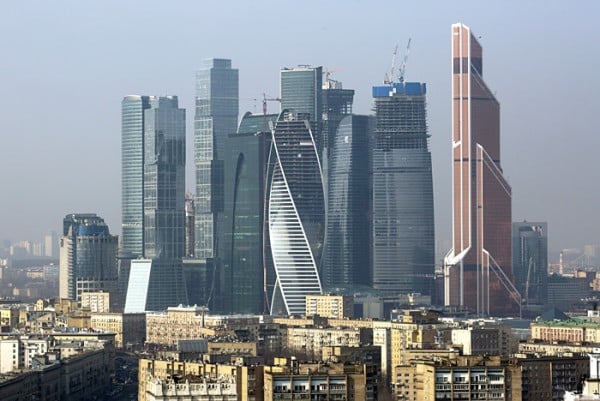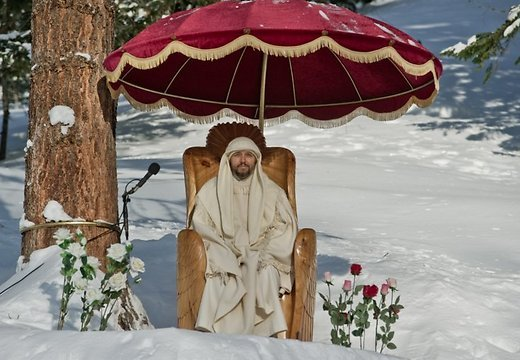
Take some London, Chicago, and mix in a little Dubai, and voilà – Moscow City (credit: mosblog.livejournal.com)
A recent book examines the struggle in today’s Russia for what and whom to believe in
The son of Ukrainian emigres to the U.K., Peter Pomerantsev took his Western upbringing and Russian language to Moscow in 2001, where he found a collective identity crisis and a Kremlin wizard behind the mass media curtain. In Nothing is True and Everything is Possible (Public Affairs, 2014), he describes a disjointed cultural landscape in Russia where belief systems are fleeting, but the search for truth is timeless.
While Pomerantsev concentrates on Moscow, he does reach far-flung regions to show the capital as a microcosm of a nation in cultural transition. Visiting a town near Vladivostok, seven time zones east, he spends time with a former gangster, Vitaly, who is now the toast of the town.

Vissarion, leader of a colony in southern Siberia, who wrote a New New Testament uniting major religions (credit: RIA Novosti)
When police and politicians became especially predatory in the 1990s, people victimized often turned to mafia-like figures, who had power and money. “Gangster-chic” was born, as shady Robin Hoods. They may have had questionable business, but they paid for schools and sports and kept unofficial order, much more than Moscow could, and endeared themselves to communities. Vitaly is now back home basking in his past, casting a schoolboy to play himself in a movie he is funding. Locals throng to see the man they had tearfully wished well on his way to prison.
Such down-is-up ironies are common in 21st century Russia, Pomerantsev writes. Students pursue MBAs, and pensioners display photographs of Stalin, their last enduring source of hope and strength.
He argues this identity crisis is widely manifested in pop culture. Theme parties feature guests dressing up as cultural icons, like Marilyn Monroe, alongside Trotsky. The author delves into the allure of cult-like organizations that trumpet self-improvement yet, upon further examination, are cash-hungry ventures designed to keep subscribers dependent, akin to some accounts of Scientology. One in particular he investigates details several young women who, flush with cash as international models, sign up for the “classes” but eventually meet strange deaths.
Architecture of various provenance, sprouting in central Moscow after 2000 and fueled by the growing energy receipts and desire to be close to the Kremlin, physically illustrates this trend. “The search for a style is psychotic. The first builds of the boom imitated whatever the post-Soviets had seen abroad and most desired: Turkish hotels, German castles, Swiss chalets.” Pomerantsev meets an architectural preservationist who tries to protect historic structures and is aghast at the frenetic and nonsensical building.
The author also mentions the resurgence in Russia of Orthodox Christianity. Now with a nationalist tinge, today’s Orthodoxy conveniently fits into the “great empire” narrative and risks widening ethnic divisions. In state-led coverage of the Ukraine crisis, leaders in Kiev are cast as fascist and Catholic (Uniates) — or traditional enemies of Russia. (Somehow forgotten is that Khruschev and Brezhnev were from Ukraine. But that was yesterday.) The Night Wolves, the motorcycle group that recently pledged to ride into Poland and celebrate Victory Day, started as a weekend bike fraternity, socializes with Putin, and rallies around the Russian cross. While the Orthodox faith provides hope and strength to millions, the Kremlin co-opts the church for its own ends.
As Putin eased into his second term after 2004, critical views of the government became less common on television. Newspapers were also feeling it, but most Russians got their news and programs from TV than radio or internet, and the state began edging out channels it did not control. In 2014, national cable providers in Russia dropped the last independently managed channel, Dozhd’ (Rain), which is now only accessible online.
Pomerantsev recounts how Channel One, the main state television channel, occupies viewers with easy cultural touchstones that transcend difficult Soviet history and the uncertain 1990s: World War II glory, advice from grandmother, the dacha seasonal garden, and simple village life. Mixed in with these narratives is noticeably American fare: a talkshow shamelessly modeled after Jimmy Fallon, “Today Show” knockoffs, and “Survivor” and “Lost” dubbed into Russian. While easily tapping the national conscience, producers mix in successful — yet politically neutral — platforms from other markets.
While perhaps just bad TV, the point is that savvy producers keep the otherwise unengaged pinned to their couches while state-directed messaging envelops them. But the silence is deafening about what the stage lacks: examination of current political issues by expert journalists in a debate forum. Investigative reporters do not star on the evening news; they carefully exchange USB drives with sources and stay under the radar, lest they be gunned down in a stairwell. Anna Politkovskaya, the journalist whom many Russians admired for her blunt coverage on Chechnya, met such a fate in 2006, as have a list of others.
Through my lens as a Russian speaker who has traveled the country in recent years, these accounts resonate, but they sometimes sound like just one more critic pointing out the exoticism and weirdness of Russia. One explanation may be that bizarre and kitschy trends have accompanied the advent of huge, sudden wealth in a society that for decades 1.) never had it and 2.) equated wealth with (evil) capitalism. With scant (recent) architectural tradition and a brand new market, the newly rich will indulge in what others deem tasteful: the German castles. They’ll flock to London and Switzerland, because that’s where the other rich are. European dealers once delightfully reeled with the naivete of Russian art buyers flush with cash.
A sideshow is easy press, but there’s a harsh reality behind the new wealth. If cities and communities were formerly run by party bosses that sought favors, the situation is worse now. Russia today has the highest degree of wealth polarization, with the richest top 10 percent owning 85 percent of national assets. On the other side of the chart, according to a 2014 Credit Suisse report, 83 percent of the population has on average less than $10,000 in wealth.
Political scientists repeatedly vow that Russia will need two or three generations before the oligarchic reins are loosened. Perhaps Channel One would consider a documentary on the Magna Carta, the 800-year-old agreement that de-centralized monarchic power of English King John and emphasized accountable, local governance. The BBC has one, and it could be easily dubbed.